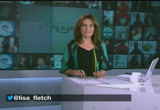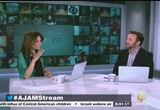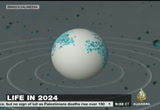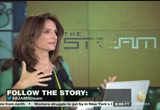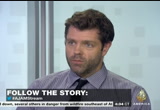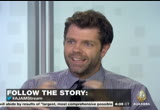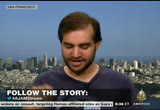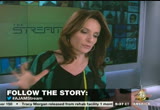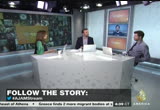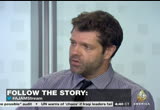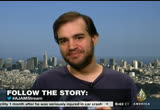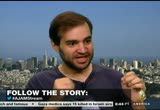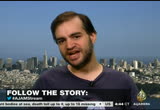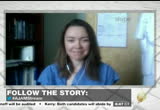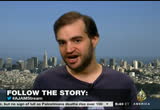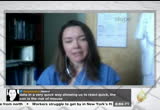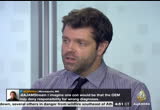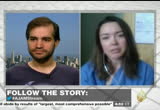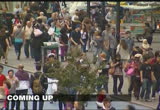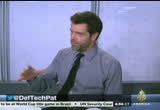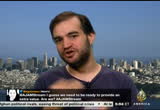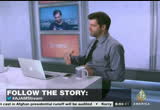tv The Stream Al Jazeera July 12, 2014 5:30pm-6:01pm EDT
5:30 pm
5:31 pm
koefsh host, nice to have you back. it's crazy when we are looking at this intersection of technology and the consumer consumption of it all of the changes that are about to happen. it feels very unrealistic in many ways. >> it does. in some ways, i think it's cool like recently i was looking for a camera bag to take on my trip with a"fault lines." now, it's the advertisement on every single website i am on. >> how does that happen. >> the weird part is i bought the camera bag. it's still on there. it's a way i want to say how do i move the conversation. >> bought it the. leave me alone? >> checking the box. i always think of these conversations that always going to say we have the flying cars by this time and we don't. it reminds me of a tweet we received that said i would like to see cars that can safely navigate themselves in 10 years. it would be helpful at 2:00 a.m.
5:32 pm
in the morning. these kind of things will do these kind of operations better than we do as humans and more safely. >> we are going to talk about how that is not that far away. there are trends all around us that point to a more interconnected lifestyle. experts say 50 billion machines and devices will be inter connected by 2020. what this means for you is a bit mind-numbing. let's start with your thermostat, fridge, car. they will communicate with each other, learn and automatically adjust your settings. >> that's barely skrauping the surface. our guests are forward thinkers here to talk about the various and often inconceivable ways life will be different by 2024. onset is patrick tucker, a tech editor for defense 1. he has been called a futurist for his writings on topics like artificial intelligence and information technology. he is also the author of the book, "the naked future" how the
5:33 pm
science of prediction changes everything. out of san francisco, dan komunskya a chief scientists for white ops, that i recognize to both of you for being here. >> happy to be here. >> patrick, the phrase, internet of things means every day object have going to have connectivity and this is something that the tech world has experienced for some tomb now. how is it going to transfer to every day consumers and what's it going to look like. >> increasingly running into object that have some computational element in them and that changes the way you interact with them. we are talking about 50 billion interconnected devices in 2020. >> it's beyond our phone? >> right. it is. uncreasingly it's going to be if you have a cardiac issue, it could be a wi-fi en and pacemaker of the kind dick cheney got and carolyn kompinsku.
5:34 pm
she is the first to use data inside her chest is sent to her doctor constantly all the tomb. if you want a nest they remember status, you are giving data, how muchnen you use to not only your local utility company to, to google. an enter connection between your e-mail client and your home they remember status and your phone. >> is my trimming going to be able to tell me when i am out of stuff. >> your fridge could easily know when you are out of stuff, order it for you and have that delivered by a drone. >> that's part of the infrastructure of connected devices. >> these thiingdz are going to anticipate what we need? it will be that sophisticated. >> that's possible. you order algorith mickcally. it's not even a matter of taking it out of the fridge and emptying. your fridge can know. it can plea order mick for you if you are interacting with a
5:35 pm
vendor like amazon that has access to the data you have on your consumer behavior. it's not just sensors in the subway looking for amonia and other potentially daningz russ things or the sensors in our chest. the big services, cloud surfaers that are collecting all of this data and using it. >> dan, are you kurpde concerned about the amount of information circulated here way beyond spoiled milwaukee and the temperature of your living room? >> not particularly. obviously we are going to have to do quite a bit in order to secure all of the information flows. but at the end of the day, we know how to secure systems. we have done it before. it's going to take awhile for all of that knowledge to move from the desktop of mobile space to the embedded world. i am confid he want it's going to happen. he specially on the 10-year time span. >> what does it mean for those who have access to that kind of technology in society today and those who don't information is
5:36 pm
being used in the management of a power grids. >> a push for what was called the smart grid. this was going to have the various large-scaly electrical components in your home, your refrigerator, your washing machine, your dryer, have all of these millions connected to your power meter and the big reason that this was going to be a huge deal is it would allowed to inform your house now is maybe not a good time to have large draws. maybe do the air conditioner a little less right now. used the next tempt will be. this is a critical thing. the actual cost of running the grid can literally be half. >> e licktricity. >> bolder, colorado tried it
5:37 pm
with the smart grid. i would like my power bill to go down. >> yeah. a lot of technology that's going to allow us to integrate a lot right to our cell phone we can do all sorts of things beyond that. for somebody like me that gets bio barely what i know, just to get through the day on the computer, how difficult is all of this integration going to be for the average consumer? >> well, it's not going to be difficult at all to be honest. over the last years, the number of new products that have come out that have been unimaginable has been astonishing. for a long time, cell phones were not very powerful computers, just did a little bit of text messaging, if that. >> that's all a cell phone did. one day, you turn around and cell phones are more powerful than any. computers i grew up with were. they blew up. really, what we are just going
5:38 pm
to see is the average products that you purchase are just going to handle all of this intelligence automatically. >> when they are handling the intelligence, like let's talk about self-driving cars. they are going to be able to communicate with each other. what is that kind of interaction of information going to do? >> well, the fundamental thing about self-driving cars is a road that will accept maybe 1500 cars an hour and is driven by humans will accept 350,0007,500 cars an hour if driven by computers. >> wow? >> they operate on a much greater speed and responsiveness. so pretty much, the one rule we see in societies and governments is that if it involves making transportation more efficient, it will get done. it is the one thing that we are excellent at thinking about on a 20-year time span. >> so we actually have someone from our community who i think is touching on the same idea,
5:39 pm
dan. it's lisa covey. she saz more single-drivers as soon as trucks and suvs are too expensive. i think what's implicit is that these self-driving cars are safer. if you have more cars on the road that they will be able to work sar around pedestrians and bikes and it all sounds so good. wh what does this philosophically say about our society? what are the larger issues one should tangle with here? >> first when we talk about stuff, absolutely right, not only can roads handle these cars much more efficiently but we are going to have a lot fewer cars. before we get into the philosophy of it and whether that's good or bad -- i hate traffic like all humans do. the market for cars goes down. a future where as a result of massive option in cities of self-driving car systems, car
5:40 pm
ownership goes down by a fact of 10. you can ride share much more ease will you is one aspect that's strange and revolutionary. i have a car. it self drives. it's going to drive me to work. someone pings me and says i would like to uber your car. i can say sure, i can send the car to pick that person up, drive that person around, i give them like a key to go over the smart phone to unlock it and sit in the driver's seat and when i need to get off of work at 5:00, it picks me up. >> i have a bigger question. what does that mean for jobs when it all becomes so automated? and then will there be a difference in who can access this kind of technology? is this a life of the privileged? what does it mean for those who can't afford it? where do they fit in to the system in the future? for jobs, it's not a great story. there is a lot of different jobs right now as we increase the level of efficient see in our economy goes the way of obsolescence. there are ways you can mitigate against it through unemployment
5:41 pm
insurance we haven't begin to thought about. but in terms of what consumers are able to access that improves because far more people are able to get where they need to go in public transportation like schemes, public, private transportation schemes involving scar sharing that don't exist. >> that's empowering for consumers who don't have a lot of money. in terms of jobs, it's not fantastic. >> where all things end, something new begins. >> that's the mother of innovation when technology forces us to move forward. i want to talk a little bit about the future of entertainment and work. how is tech going to impact those two things in terms of how -- particularly in terms of how we consume our entertainment? >> the biggest thing i see changing is the nature of displaced and three dimensional television. you know, 350,000d t.v. was not a very big success but the problem was you had to wear glasses. >> yeah. something looked a little wrong. what the story was a lot of engineers thought 350,000d rirmd
5:42 pm
one image to go to one eye and another image to go to another. >> that's not how the human visual system works. you need to focus. you need to focus on something that's close or something that's far away. >> requirement to shift your eyes' focus wasn't met by 350,000d display and 350,000d movies and it meant eventually it became difficult to look at even without the glasses. what we are going to end up getting is something called light field displaced. in a light field display, every photon of light comes from the display isn't blasting out every direction. you actually have a photon going another angle, another angle and what this means is a display instead of looking like a flat surface or even a flat surface with a weird 350,000d element to it, it will actually look like a window or a mirror. >> it has dimension? >> it will have a full 350,000d feel to it. it will look like a window into another world, like you could
5:43 pm
put your happened right through it. where this has impact not just entertainment but on work, it will make tell commuting a heck of a lot easier. we have been on these tell conferences where, you know, you are looking at someone talking but they are looking to the side because they are looking at a camera that is far away from where the actual screen is. what we are going to end up, also, with are screen, cameras integrated into the very fabric of the displays that we are looking at. so when you are looking at somebody's eyes, they are looking at your eyes as well. >> again, how far away are we from that kind of technology being used, you know, consistently. >> we are about a year or two away from 350,000d displaced head mounted, a company called occulus rift that has a 350,000d and invidio that makes a lot of chips that has a light field display that goes over your eyes in a head-mounted way. in terms of the full displaced
5:44 pm
that we look in, we are at about 4k televisions now. the screens seem to be about 16 to 350,0002 k before they are able to do this full lute field capability. >> certainly by 2024? right? >> oh, yeah. by 2024, probably about 2017 to 2018. >> okay. >> if not sooner than that. this is coming. we are on the train. >> josh, sinus up. what if you could get a until check-up from the palm of your hand? it is not that far away either. up next, the future of health and how hospital waiting rooms may be a thing of the past and in some cases, even doctors may not prove to be the necessity they are now. and later, how tech will eliminate uncomfortable small talk at parties and guide you to the people with whom you have the most in common. stay right where you are. ♪ >> next saturday >> prop 8, really made us think about this process of coming out. >> meet the committed couples >> gay marriages, straight marriages... have the same challenges.
5:45 pm
>> it's all about having the same options as everybody else. >> that fought for equality >> saying "i do" changed everything. >>every saturday, join us for exclusive, revealing and surprising talks with the most interesting people of our time. "talk to al jazeera" next saturday 5 eastern only on al jazeera america
5:47 pm
technology which experts predict will become common place by 2024. joining us on skype is dr. heather evans at the university of washington. she is also the 80or of m-power, an app that evaluates a patient's healing process post-operation. thank you for joining us. your group is building this this mobile app that allows patients to monitor their wounds for signs of infection. how could an app like that change patient outcomes? >>ness well, we are really hoping to see an improvement in patient outcomes because we would be able to detect something going wrong maybe a little sooner we would with our current state of care. right now, we rely on patients to notice that something is wrong and then to make a telephone call or to come to the emergency room to be able to make the neck step in nair care. we would like to see a more active communication between the patient and their provider and this, we hope that this app will
5:48 pm
facilitate that >> are post subject infections problematic? do they frequently or occasionally even lead to death. >> they are a big problem for us as surgeons and i think we have actually under appreciated the significance of these infections in the past. some recently data has suggested we may be seeing about one in four patients doling a surgical site infection or a wound problem after surgery after certain kinds of surgery. >> wow. >> so it is the most expensive healthcare associated infection that we know about. >> what other ways do you see tech shaping healthcare in the future. >> it's a matter of all of the information that can be acqui d acquired. you have hand held devices that will give you your realtime blood grew close ratings for die betics, the quantified self movement that says we shouldn't just be getting health information every once in a whi while.
5:49 pm
we should have realtime monitoring like we have for some of our computer systems. collecting your heart rate, res pration, how much your skin is sweating, being able to get all of these data points, not just every once in a while but beingability get them continue with usually every few minutes for long periods of time is going to revolution a'size our ability to honestly watch our health change before we get to the point we feel ourselves get sick, we will see these signs and say, uh-oh, something is starting to go wrong. >> you saw something our viewers are thinking about. vanessa says it's risky. people think they can diagnose themselves instead of going to doctors or they don't trust doctors' diagnosis. how often do you see that? someone comes in and they diagnose themselves because of what they have read on the internet and you have that kind of challenge to overcome? well, i think this is going to be a big problem for providers in particular because we just don't know how to deal with all
5:50 pm
of this massive amount of information that's going to be coming at us if patients are going to be at home taking their blood pressure every day or taking it more often. how do we interpret those values? do we know what they were doing when they took their blood pressure? and i think trying to integrate this information is going to be a big challenge for us. on the other hand, it's a very exciting time. >> patrick, we are talking about all of our million information potentially floating around out there at some point. >> yes. >> do you have concerns about discrimination based. >> i think in order to realize the true benefits of this revolution -- because i think as we are pointing out, it does have potential to change the way we access healthcare, to make it much more efficient, to continue with us will you understand your own health state and add to the body of medical knowledge exponentially as we are able to view every way's health state in the context of everyone's health state. it's wonderful. we need it to make sure it
5:51 pm
reaches its full potential, we have to start talking about did you say criminal nation right now. there is no law that actually prohibits an insurance company from discriminating against you on the basis of self-collected data. there are laws that prohibit insurance companies from discriminating on you on pre-existing conditions. there are laws that prohibit insurance companies from discriminating yagainst you on your genetic information but we need to push for laws that prevent insurance companies from discriminate okay self data to realize the benefits of this. more people will feel empowered so we can integrate this stuff more fully and realize the results more quickly. >> i would like to jump in there because i think that there is a balance between the privacy that you give up and the benefits that you receive from giving up that privacy. you know, if we were all asked the question: if your child was in the emergency room and you were not there and he was
5:52 pm
unidentified, would you want all of the possible information available to be able to take care of the child before you were able to get there and provide it yourself? and i 13 we would all say yes. but that comes at a cost. right? if we want to have privacy, we are going to not have that information available. and that's the current state of affairs right now. >> dr. evans, josh and i were talking about the millennial generation is the first not to have experienced full privacy in terms of the way others older than them have. do you notice a generational difference with the willingness to give up information? >> i have. increasingly, it doesn't matter what age you are, if you are tech-saavy and you are enjoying you're smartphone, the ease of being able to take a selfie of your wound and saying to your doctor, i am texting you this message. can you please look at my wound and tell me what it looks like? this is something that my patients have been doing for the last several years, and this is really where our app started was
5:53 pm
that we wanted to address this privacy issue. we wanted a secure and standardized way for us to communicate safely with our patients, but to be able to make it easy. >> uh-huh. thank you very much, dr. heather evans for coming on the show. still ahead, forget about texting, tweeting, olbermann, the future of how we socialize is next and the amount of information you will know about total strangers will shock you. we will see you in two minutes. >> on tech know, imagine getting the chance to view the world. >> the brain is re-learning how it sees again >> after decades in the dark, >> i couldn't get around on my own >> a miraculous bionic eye... >> i'm seeing flashes >> great >> tech know, every saturday go where science meets humanity. >> this is some of the best driving i've every done, even though i can't see. >> tech know. >> we're here in the vortex. only on al jazeera america. @
5:55 pm
america mobile app, available for your apple and android mobile device. download it now >> welcome back. ♪ >> welcome back. we are discussing how luf will be different in 10 years with some leading forward thinkers patrick tucker, so before the break, i said we are going to be able to go to cocktail parties in the future and not have that awkward small talk with people
5:56 pm
we have nothing in common. tech would help guide us to people we would want to talk to in the first place. how will that happen? >> one of the things about talking about the future is that william gibson's quote is the future has arrived but it's not end of distributed. it w it was a reality in 1995 at mit where a young researcher named nathan agle wanted to -- he took a conference and he wanted to get the people to conference to enter arm with each other so that everyone was enter aking with someone who was going to be -- have a good interaction with a particular person. he handed out these mobile phones and he had everyone carry around with them and fill out a little profile and then the mobile phones would tell them who they were supposed to interact with. it worked well. a lot of people liked it. what you ran in to was a problem that i talk about in my book as the prettiest girl in the room syndrome. everybody wanted to talk to nicholas negraponte, a big, you know, head founder of mit
5:57 pm
founder lab didn't want to talk to anybody. this is the problem you are going to find when we begin to integrate this okay cupid tinder jeo mobile way of relating through our phones to the real world. this is a problem that you are going to keep encountering as people being told to go interact with someone because that's a great person for that person to interact with but it's sort of a minus for the guy on the other end. >> sounds like what some of our audience is tweeting about right now. this is from laura bustante, perhaps a physical address will be replaced by a social network address since i predict everyone will be on a social network. dan, is that to you? will every way be on a social network in the near future? >> honestly, there is two groups of people that you can consider yourself around. there is the people that you are physically with, and then there is everybody else, the people you could be texting, the people you could be tweeting with, e-mailing and it's become a little bit of a problem. everyone sitting around dipper,
5:58 pm
chatting, there is a lull in the conversation and auchltdz everyone runs to their phones to pull them out to see what all of the buzzing was about. it's a real issue where people are almost having trouble being present and i think the biggest thing that will change in the next 10 years will be the development of these social mores about when it is actually inappropriate to be with your online community and know this is a moment you should just be here now. now, that being said, there is this huge problem we have in the here and now which is a lot of us have trouble remembering names and matching names to faces. >> yeah. >> let me tell you, if i have to wear a piece of gear on my head to know the name of the person i am talking to, i will look like the biggest dork. no problem. just tell me their name, please. >> you raise an interesting point there because inev-i believe ity, does all of this technology really increase our isolation? >> right. >> always facing the phone or face in the gadget but it sounds like what dan is saying and
5:59 pm
patrick, tell me if you agree that there is going to be more rules essentially about when we interact with our devices and when we don't or they are all going to be so integrated we don't even notice? >> there is, i think we are beginning to reach the point where we are annoyed enough by the way other people interact with devices that we are going to understand the way we have act with devices and that's all that has to happen. we start to look at what annoys us and we change our behavior. i don't see it a asfuge barrier to future interaction but i think what will change is the amount of information you have to bear on any social encounter. it's not just stuff that would go into a static profile like occupation and maybe even their clout rank if you want to get like really competitive but it could be stuff how best to interact with this person in terms of how to talk, when to listen, when to interrupt, when not to interrupt, how much they enjoy back and forth versus single monologue, all of this is
6:00 pm
going to be something that's available to us. >> all right. thanks to all of our guests. we will see you online. ♪ this is "al jazeera america." i am thomas drayton in new york. let's get you caught up on the top stories at this hour. five days of bombbardment, death toll rises in gaza as israel widen's it's missils attacks. >> this is the strongest possible signal by both candidates of a desire to retore legitimacy to the process and to afghan democracy. >> secretary of state john kerry tries to end the fight over who won afghanistan's presidential election. in ukraine, fighting spreads
65 Views
IN COLLECTIONS
Al Jazeera America Television Archive
Television Archive  The Chin Grimes TV News Archive
The Chin Grimes TV News Archive  Television Archive News Search Service
Television Archive News Search Service 
Uploaded by TV Archive on

 Live Music Archive
Live Music Archive Librivox Free Audio
Librivox Free Audio Metropolitan Museum
Metropolitan Museum Cleveland Museum of Art
Cleveland Museum of Art Internet Arcade
Internet Arcade Console Living Room
Console Living Room Books to Borrow
Books to Borrow Open Library
Open Library TV News
TV News Understanding 9/11
Understanding 9/11